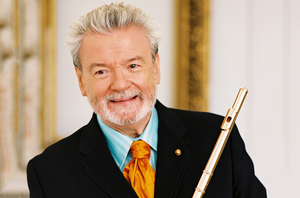 Sir James came to town with his golden flute.
Sir James came to town with his golden flute. More to the point, he remains an impressive master of his instrument. Throughout the concert, his distinctive tone was much in evidence: clear, articulate, and as bright as the sun. He wasn’t always perfectly in tune (he tends to sharpness), but his big sound filled the hall with a presence and immediacy that made every note he played come alive. Moreover, he possesses such a deeply ingrained technique that his flute seems to play itself.
In Debussy’s Claire de Lune (performed in an arrangement for flute and piano, with pianist Anne Marshall) Gallway’s playing was rich in overtones, and endowed with a lyrical vibrato. And his performance of Il Pastore Svizzero by Pietro Morlacchi (again with Marshall) culminated in a delightful flurry of pretty notes.
As the concert continued, Galway was joined by two other flautists. His wife, Jeanne Galway, made a cameo appearance in Franz and Karl Doppler’s Rigoletto Fantasie for two flutes and piano. She has the same kind of tone as her husband, and when they played together, the sound was intense and dazzling.
The other flautist was Toronto-based Bill McBurnie, who spelled Galway off with a stylish approach to Moe Koffman’s Swinging Shepherd Blues and Bernie Senesky’s Paco Paco. McBurnie brought his own sidemen to the stage: Senesky on piano and bassist Roberto Occhipinti. However, when he was joined by Galway in a jazzy version of Greensleeves, Galway as clearly unfamiliar with the score, and his contribution wasn’t especially effective.
The second half of the program returned to classical repertoire, mostly of a lighter sort. François-Joseph Gossec’s Tambourin (arranged for flute, piano and string quartet, with violinist Laura Lutzke completing the quartet) and Marin Marais’ Le Basque were both fresh and jaunty.
Invoking his Irish roots, Galway, his pianist and his string players gave Hamilton Harty’s In Ireland lush and high-minded performance. (He evidently takes this overwrought medley of folk melodies more seriously than I could.) David Overton’s arrangements of Irish folk melodies were less elaborate and more effective.
To conclude, Galway traded his gold flute for a pennywhistle in Henry Mancini’s Baby Elephant Walk. (It was time for a little audience participation, so Galway had everyone shout “Henry!” after the tune’s first phrase, whenever it returned.) It was a charming end to a charming program.
And there were encores, including Danny Boy, and an Overton piece called Badinereelerie – a clever blend of Bach and Irish folksong.
© Colin Eatock 2014
 RSS Feed
RSS Feed

